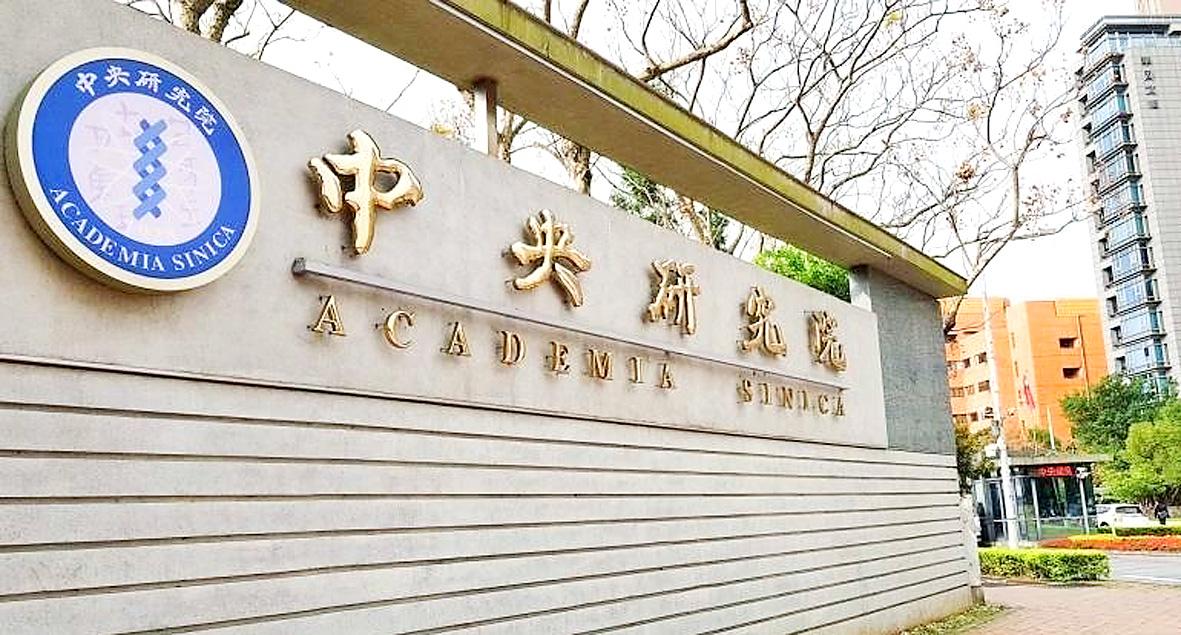Academia Sinica is to confer coveted academician membership only to distinguished academics who are Republic of China (ROC) citizens starting next year, its spokesman Kenneth Wu (伍焜玉) said yesterday.
His comment came a day after the institution announced the change to qualification rules in a news release marking the opening of the 34th Convocation of Academicians.
Candidates for becoming academicians would be required to state whether they are Republic of China citizens in writing during the application process for next year, but the rule change does not affect this year’s convocation, he said.

Photo: Yang Yuan-ting, Taipei Times
The institution is mulling the establishment of foreign and honorary academicians as separate honors from national academicians, which would require the legislature to amend the Organic Act of the Academia Sinica (中央研究院組織法), he said.
As the creation of new types of academicians would be a significant change for the institution, it would proceed cautiously with a mind to building a consensus, he added.
Academicianship is a lifelong, non-remunerated position granted to academics of Chinese descent in recognition of outstanding achievement regardless of their citizenship.
Citing the Nationality Act (國籍法), some academicians said that the nation’s citizenship laws are based on descent, which means anyone with a parent born in China before 1949 is legally a citizen of the Republic of China
“This qualifies half of China as potential candidates for academicianship,” they said, suggesting that Academia Sinica should specify that academicians must have a Republic of China passport or national identification card.

Taiwan is gearing up to celebrate the New Year at events across the country, headlined by the annual countdown and Taipei 101 fireworks display at midnight. Many of the events are to be livesteamed online. See below for lineups and links: Taipei Taipei’s New Year’s Party 2026 is to begin at 7pm and run until 1am, with the theme “Sailing to the Future.” South Korean girl group KARA is headlining the concert at Taipei City Hall Plaza, with additional performances by Amber An (安心亞), Nick Chou (周湯豪), hip-hop trio Nine One One (玖壹壹), Bii (畢書盡), girl group Genblue (幻藍小熊) and more. The festivities are to

Auckland rang in 2026 with a downtown fireworks display launched from New Zealand’s tallest structure, Sky Tower, making it the first major city to greet the new year at a celebration dampened by rain, while crowds in Taipei braved the elements to watch Taipei 101’s display. South Pacific countries are the first to bid farewell to 2025. Clocks struck midnight in Auckland, with a population of 1.7 million, 18 hours before the famous ball was to drop in New York’s Times Square. The five-minute display involved 3,500 fireworks launched from the 240m Sky Tower. Smaller community events were canceled across New Zealand’s

‘IRRESPONSIBLE’: Beijing’s constant disruption of the ‘status quo’ in the Taiwan Strait has damaged peace, stability and security in the Indo-Pacific region, MOFA said The Presidential Office yesterday condemned China’s launch of another military drill around Taiwan, saying such actions are a “unilateral provocation” that destabilizes regional peace and stability. China should immediately stop the irresponsible and provocative actions, Presidential Office spokeswoman Karen Kuo (郭雅慧) said, after the Chinese People’s Liberation Army (PLA) yesterday announced the start of a new round of joint exercises around Taiwan by the army, navy and air force, which it said were approaching “from different directions.” Code-named “Justice Mission 2025,” the exercises would be conducted in the Taiwan Strait and in areas north, southwest, southeast and east of Taiwan

UNDER WAY: The contract for advanced sensor systems would be fulfilled in Florida, and is expected to be completed by June 2031, the Pentagon said Lockheed Martin has been given a contract involving foreign military sales to Taiwan to meet what Washington calls “an urgent operational need” of Taiwan’s air force, the Pentagon said on Wednesday. The contract has a ceiling value of US$328.5 million, with US$157.3 million in foreign military sales funds obligated at the time of award, the Pentagon said in a statement. “This contract provides for the procurement and delivery of 55 Infrared Search and Track Legion Enhanced Sensor Pods, processors, pod containers and processor containers required to meet the urgent operational need of the Taiwan air force,” it said. The contract’s work would be